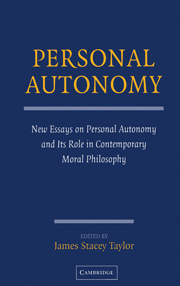Book contents
- Frontmatter
- Contents
- List of Contributors
- Acknowledgments
- Introduction
- PART I THEORETICAL APPROACHES TO PERSONAL AUTONOMY
- PART II AUTONOMY, FREEDOM, AND MORAL RESPONSIBILITY
- PART III THE EXPANDING ROLE OF PERSONAL AUTONOMY
- 12 Procedural Autonomy and Liberal Legitimacy
- 13 The Concept of Autonomy in Bioethics: An Unwarranted Fall from Grace
- 14 Who Deserves Autonomy, and Whose Autonomy Deserves Respect?
- 15 Autonomy, Diminished Life, and the Threshold for Use
- Index
14 - Who Deserves Autonomy, and Whose Autonomy Deserves Respect?
Published online by Cambridge University Press: 03 December 2009
- Frontmatter
- Contents
- List of Contributors
- Acknowledgments
- Introduction
- PART I THEORETICAL APPROACHES TO PERSONAL AUTONOMY
- PART II AUTONOMY, FREEDOM, AND MORAL RESPONSIBILITY
- PART III THE EXPANDING ROLE OF PERSONAL AUTONOMY
- 12 Procedural Autonomy and Liberal Legitimacy
- 13 The Concept of Autonomy in Bioethics: An Unwarranted Fall from Grace
- 14 Who Deserves Autonomy, and Whose Autonomy Deserves Respect?
- 15 Autonomy, Diminished Life, and the Threshold for Use
- Index
Summary
“Autonomy,” “respect for autonomy,” and “rights of autonomy” are different notions. “Respect for autonomy” and “rights of autonomy” are moral notions, but “autonomy” and “autonomous person” are not obviously moral notions. Indeed, they seem more metaphysical than moral. However, this distinction between the metaphysical and the moral has Fostered precarious claims such as these: (1) Analysis of autonomy is a conceptual, metaphysical project, not a moral one; (2) a theory of autonomy should not be built on moral notions, but on a theory of mind, self, or person; and (3) the concept of autonomy is intimately connected to the concept of person, which anchors the concept of moral status.
I will be assessing these claims with the objective of determining who qualifies as autonomous and what sort of autonomy deserves our respect. I will argue that moral notions – in particular, respect for autonomy – Should affect how we construct theories of autonomous action and the autonomous person. However, theories of autonomy should only be constrained by the principle of respect for autonomy, not wholly determined by it.
CONCEPTS AND THEORIES OF AUTONOMY
Autonomy is generally understood as personal self-governance: personal rule of the self free of controlling interferences by others and free of personal limitations that prevent choice. Two basic conditions of autonomy, therefore, are (1) liberty (independence from controlling influences); and (2) agency (capacity for intentional action). However, disagreement exists over how to analyze these conditions and over whether additional conditions are needed. Each of these notions is indeterminate until further specified, and each can be used only as a rough guide for philosophers in the construction of a theory of autonomy.
- Type
- Chapter
- Information
- Personal AutonomyNew Essays on Personal Autonomy and its Role in Contemporary Moral Philosophy, pp. 310 - 329Publisher: Cambridge University PressPrint publication year: 2005
- 26
- Cited by



